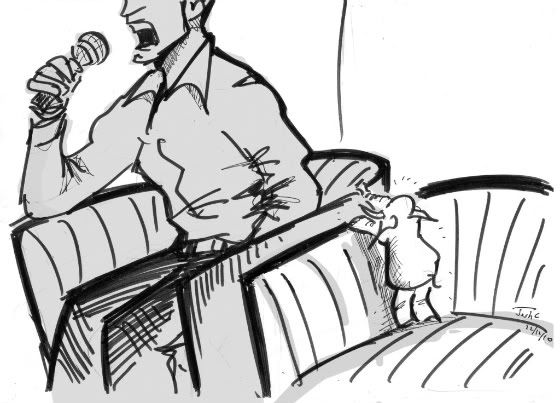Donaldson Tan

Elephants are usually not that small.
So it turned out that the People’s Action Party (PAP) had skipped the biggest political event of the year. Organised by The Online Citizen (TOC), the F2F Forum, held on 16 December 2010 at the Quality Hotel, had attracted more than 300 members of public. Pointing to the empty chair on stage, the forum moderator Mr Remy Choo said, “We actually did invite the PAP. We sent an email to the Secretary-General PM Lee. We also reached out to a MP. He asked for clearance but didn’t get it, so unfortunately that’s the elephant in the room tonight.”
An elephant in a room would be impossible to overlook. By ignoring the elephant, occupants in the room made the choice to concern themselves with tangential issues rather than dealing with the looming big one. Therefore, it would be erroneous to describe PAP’s absence as an “elephant”. During the 3-hour forum, issues such as affordability of public housing, foreign talent policy, national service and minimum wage were raised. PAP’s policies were addressed, not ignored. The panelists collectively emphasised the need for HDB to provide affordable public housing, called for the abolition of the Internal Security Act, called for raising the quantum for Workfare and discussed their position on defamation laws in Singapore.
What the PAP has clearly missed was the opportunity to enrich the policy debate in Singapore by invoking other stakeholders such as the other political parties, civil society and concerned members of the public. But this is not new. The institution of Parliament has been reduced to a mere rubber-stamp committee through the imposition of the party whip and overwhelming presence of the ruling party in the Parliament that curtailed the need for further debates. If the PAP sees no need to enrich debate in Parliament, why would it see fit to enrich policy debate outside Parliament?
Yes, TOC has been snubbed by the ruling party, together with supporters for the live televised General Election debate. Back in May 2010, the question of live TV debate during General Election was raised in the public sphere. Sure there was raging interest with supporters eschewing arguments such as how a live debate would engage young voters and renew interest in nationhood with the PAP camp dismissing how a live debate would turn policy issues into a question of style over substance. We didn’t see this manifest among the Opposition leaders present at the F2F forum. If PAP proclaims that their leaders are superior to Opposition leaders, then they would even be less likely to fall to the temptation of turning public debates into one where style over-rides substance.
Worst of all, the cost of the PAP’s absence at the F2F Forum was bore disproportionately by the public. The Opposition political parties present were able to capitalise on PAP’s absence by delivering a more candid appraisal of the ruling party and their policies, winning cheers and applauses from the floor. Yet the public is short-changed because they are denied an opportunity to clarify with the horse’s mouth on policies that impact their lives and obtain details on these policies. Furthermore, in the absence of the PAP, the Opposition political parties need not further refine their points and disagreement with PAP on specific policies too.
For example, the issues of raising HDB cost, foreign talent policy, healthcare all point to a larger trend which has yet to be addressed adequately by the Opposition political parties combined – aging population. By 2050, Singapore’s median age will be 54, similar to Japan and Italy. Singapore will be among the demographically oldest countries in the world. There will be fewer working adults to look after more aged dependents. The spillover of the impact of the aging population trend will include national productivity, economic revitalisation, social, transport and healthcare infrastructure.
The F2F Forum is only but one of the instances whereby PAP’s absence has stifled the development of a marketplace of ideas. Without meaningful ideas and information being placed on the pedestal in such forums, it is impossible for any political actors to take substantial action. Unless voters send the message that PAP’s absence would erode its relevance to the public, democracy in Singapore won’t be better off.
—
Photo courtesy of The Online Citizen. This article was first published by The Online Citizen on 22 December 2010.


Why is the PAP’s presence required? Surely, by now, everyone knows what their stance is on things like affordability of public housing, foreign talent policy, national service and minimum wage. Their justification for these policies is also well-known. Besides, this was a public event organized by TOC and their presence would have lent an air of respectability to TOC, which is something they would not have wanted. If you want to have a public discussion, get the NUS Political Association or one of the public think tanks to organize it, not TOC.
Hi Fox, I think you over-rated NUSPA. NUSPA events are not open to the public and NUSPA doesn’t allow political party members to be among the audience, unless it is a special request which is granted to a very limited extent. Besides, you miss the point: the Opposition and other stakeholders have no opportunity to cross-examine the PAP, not even in parliament and in the Select Committee.
You have a point. It is very difficult to find occasions to have sensible debate over certain policies. However, I think the primacy of getting the PAP to turn up is more important than having an inclusive audience. The minute you have the TOC sending an invitation to the PAP, the first thing that comes to their mind is that you are trying to make them to look bad. Their guard would be up. It’s not simply the PAP’s style to have open debate over policies at a opposition-organized event. (Yes yes, I know that TOC is officially non-partisan but that is probably how the PAP perceive it).
Hi Fox,
TOC founder Remy Choo actually participated with PAP in a panel before (in September or October). The PAP MP in that panel was Lim Wee Kiat (chairman of the transport GPC). The forum wasn’t well publicised and it targeted youths attending upper secondary school, JCs and polytechnics.